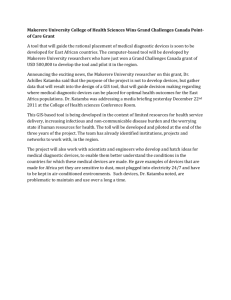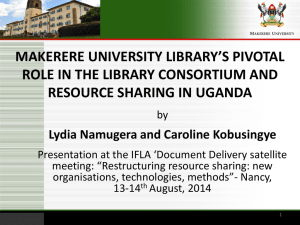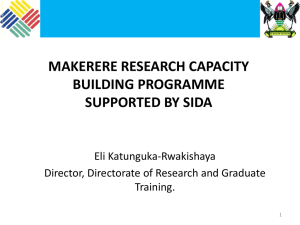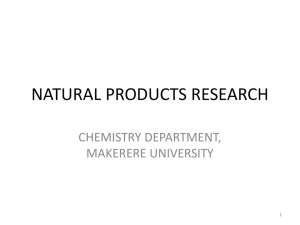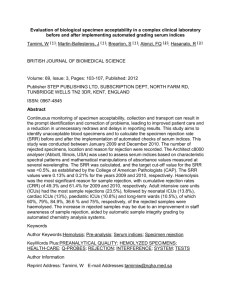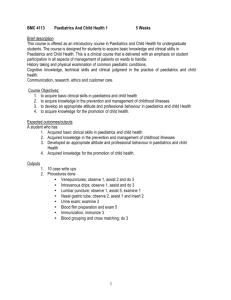FOM 2211 PRINCIPLES OF MICROBIOLOGY AND PATHOLOGY
advertisement
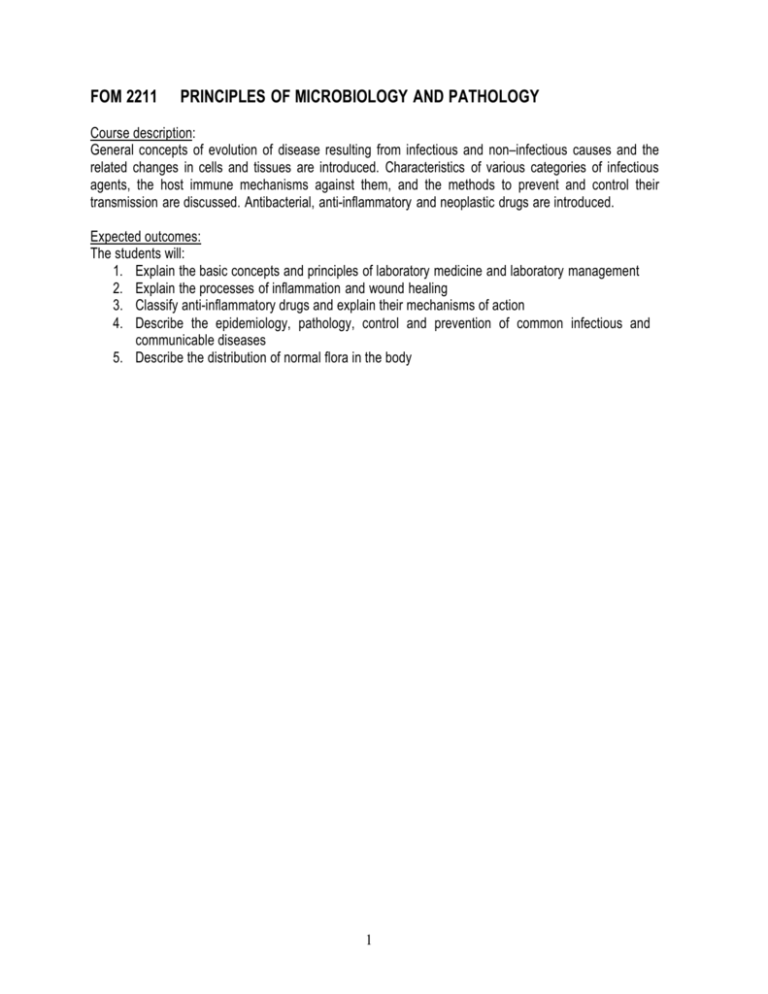
FOM 2211 PRINCIPLES OF MICROBIOLOGY AND PATHOLOGY Course description: General concepts of evolution of disease resulting from infectious and non–infectious causes and the related changes in cells and tissues are introduced. Characteristics of various categories of infectious agents, the host immune mechanisms against them, and the methods to prevent and control their transmission are discussed. Antibacterial, anti-inflammatory and neoplastic drugs are introduced. Expected outcomes: The students will: 1. Explain the basic concepts and principles of laboratory medicine and laboratory management 2. Explain the processes of inflammation and wound healing 3. Classify anti-inflammatory drugs and explain their mechanisms of action 4. Describe the epidemiology, pathology, control and prevention of common infectious and communicable diseases 5. Describe the distribution of normal flora in the body 1 6. 7. 8. 9. 10. 11. 12. 13. 14. 15. Discuss the clinical pharmacology of drugs used in communicable diseases Explain abnormal accumulations and pigmentation in the body Describe and explain immune mediated disorders of the body Explain the pathology related to alteration in cell growth Explain the pathology related to cell injury and death Describe and explain the pathology of common genetic and chromosomal disorders Describe the ethical implications in handling hazardous bio-agents Explain the principles of immunology Describe the taxonomy and characteristics of bacteria Describe the principles of disinfections and sterilization Course Objectives 1. To explain the basic concepts and principles of laboratory medicine and laboratory management 2. To explain the processes of inflammation and wound healing 3. To classify anti-inflammatory drugs and explain their mechanisms of action 4. To describe the epidemiology, pathology, control and prevention of common infectious and communicable diseases 5. To describe the distribution of normal flora in the body 6. To discuss the clinical pharmacology of drugs used in communicable diseases 7. Explain abnormal accumulations and pigmentation in the body 8. Describe and explain immune mediated disorders of the body 9. Explain the pathology related to alteration in cell growth 10. Explain the pathology related to cell injury and death 11. To describe and explain the pathology of common genetic and chromosomal disorders 12. To describe the ethical implications in handling hazardous bio-agents 13. To explain the principles of immunology 14. To describe the taxonomy and characteristics of bacteria 15. Describe the principles of disinfections and sterilization Course Content: • Laboratory Medicine: Principles and concepts of laboratory medicine in: clinical chemistry, toxicology; immunology; haematology; microbiology; parasitology; organization of laboratory services in a hospital. The concepts of life and death International code of notifiable diseases • Inflammation: Healing and repair, Anti-inflammatory agents • Common infectious and communicable diseases: Pathology, epidemiology; control and prevention; effect on nutritional status; nosocomial infections: chemotherapeutic agents • Abnormal and Accumulations and Pigmentation: Amyloidosis, melanin and uric acid deposition; calcification, hyalinization, jaundice • Immune Mediated Disorders: Classfication and immunological features of: allergic and hypersentivity reactions, autoimmune diseases; immunodeficiency disorders. Graft rejection mechanisms in clinical transplantation • Alteration in Growth Control: responses of cells to toxic and radiation injuries. Alterations in growth control. Neoplasms. Anti-neoplastic agents • Genetic Disorders: Metabolic, psychiatric and blood disorders of genetic origin. Chromosomal abnormalities. Genetic causes of wastages and neotal mortality. Ethical issues in genetic counseling. Genetherapy. Epidemiologyt of genetic disorders 2 • • • Investigative Procedures: Histopathological, haematological, Microbiological, biochemical, Immunological, forensic procedures and imaging techniques. Autopsy pathology Principles of Microbiology: Parasitology, virology, bacteriology and mycology, principles of diagnosis, (Infection control, sterilization, disinfection) use of anti-microbial agents, resistance, synergism and sensitivity tests, personal hygiene practices and handling of equipment, cross infection control Immunology: antibody dependent and independent effectors mechanisms, Immune evasion mechanisms and vaccines, immuno-diagnostic tests Delivery methods: The course is delivered through: Overview lectures, Self directed learning, Tutorials, Laboratory practicals, Clinical exposures, Wrap-up seminars Duration: 5 weeks, CH - 75 Available Resources: Teaching laboratory with fitted benches: 1800M2, Clinical laboratories in the department of Medical Microbiology and pathology, Mulago Hospital wards and clinics, Office space, 50 Microscopes Available staff Name Qualifications Employer Ass Prof. Joseph Olobo Ass Prof. Kaddu-Mulindwa Prof. G. Bimenya Ass Prof. Henry Wabinga Ass. Prof Wilson Byarugaba Prof. Ogwal Okeng Ass. Prof. C. Obua Ass. Prof. Paul Waako Dr. Moses Joloba Dr. Najjuka C.F Dr. Freddie Bwanga Dr. Benon Asiimwe Dr. David Kateete Dr. Kajumbula H M Dr. Beatrice Acan Dr. Michael Odida Dr. Dan Wamala Dr. Martin Kalyemenya Dr. Nsereko Mukasa Dr. Male Mutumba Dr. Emmanuel Othieno Dr. Sylvester Onzivua Dr. Lynette Tumwine Dr. Hawa Nalwoga Dr. Sam Kalungi Dr. David Lukande Dr. Suzan Nabadda PhD, B. Vet Medicine PhD, B. Vet Medicine PhD, M.Sc, B.Sc. M.D., M. Med, MBChB PhD, M.Sc, PhD, M.Sc, MBChB PhD, M.Sc, MBChB PhD, M.Sc, MBChB PhD, M.Sc, MBChB M. Med, M.Sc, MBChB M. Med, MBChB PhD, M.Sc, B. Vet Med M.Sc, B. Vet Med M. Med, MBChB BDS M. Med, MBChB M. Med, MBChB M. Med, MBChB M. Med, MBChB M. Med, MBChB M. Med, MBChB M. Med, MBChB M. Med, MBChB M. Med, MBChB M. Med, MBChB M. Med, MBChB M. Med, MBChB Makerere Univ Makerere Univ Makerere Univ Makerere Univ Makerere Univ Makerere Univ Makerere Univ Makerere Univ Makerere Univ Makerere Univ Makerere Univ Makerere Univ Makerere Univ Makerere Univ Makerere Univ Makerere Univ Ministry of Health Ministry of Health Ministry of Health Ministry of Health Ministry of Health Ministry of Health Makerere Univ Ministry of Health Ministry of Health Makerere Univ Ministry of Health 3 Full time Full time Full time Full time Part time Full time Full time Full time Full time Full time Full time Full time Full time Full time Full time Full time Part time Part time Part time Part time Part time Part time Full time Part time Part time Full time Part time Dr. Bossa Dr. Norah Mwebaze Mr. Dan Kibuule Dr. Sarah Nanzigu Mr. Waiswa Muzawalu Mr. Dan Ssempala Mr. Osuwat M.Sc, B. Vet Medicine MSc, MBChB M.Sc, B.pharm M.Sc, MBChB M.Sc. BBLT, Dip Med Lab Tech Dip Lab Technology M.Sc. BBLT 4 Makerere Univ Makerere Univ Makerere Univ Makerere Univ Makerere Univ Full time Full time Full time Full time Full time Makerere Univ Makerere Univ Full time Full time
